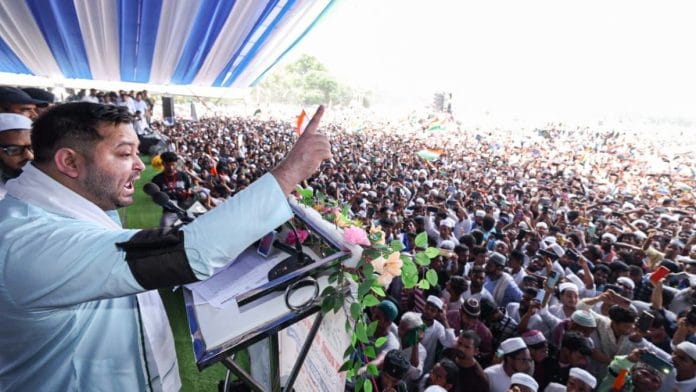Imarat-e-Shariah, a strong socio-religious group with a big influence on a section of Indian Muslims, organised a huge protest on 29 June at Patna’s Gandhi Maidan. The rally, named ‘Waqf Bachao, Samvidhan Bachao – Save Waqf, Save the Constitution’ – quickly gained momentum, with thousands of Muslim protesters from Bihar and nearby states vocally condemning the Waqf Act amendment as a violation of both constitutional rights and religious freedom. This was not just a protest; it was a firm declaration against a law perceived as an infringement on fundamental freedoms—freedoms that many believe must be protected at all costs.
Speakers at the rally claimed that the Waqf Amendment Act crushes not only the Islamic principle of Waqf (charitable endowment) but also assaults the very core of religious autonomy. Faisal Wali Rahmani, head of Imarat-e-Shariah, made it clear: the Act is a dangerous overreach that jeopardises the community’s ability to govern its own affairs. “This conference,” he declared, “is a peaceful, constitutional demand to roll back this draconian legislation.” His words rang out as a challenge to those who would allow such overreach to stand unchecked.
I fully agree that every Indian has the right to free speech and peaceful protest, as guaranteed by our Constitution. But the argument surrounding religious autonomy is far more complicated than it seems. This notion of autonomy isn’t about personal religious practice—it’s about collective and organisational control.
The idea that a religious group should have the unrestricted right to manage its own affairs raises some troubling questions. First, does this imply that such a group is somehow separate, not truly a part of the larger nation? Second, is there not a risk in projecting this image of self-containment—as though the community exists outside the national fabric? The implications are far more profound than they may appear.
What if every community or tribe starts to argue that no one has the right to interfere in their affairs, claiming that their practices and core values are above the reach of national laws or human rights? Imagine a community that argues the government should have no say in child marriage, defending it as a matter of religious or cultural tradition. Would such a stance be accepted simply because it aligns with the idea that each group should be able to uphold its own values? Surely, we would not accept such practices under the guise of religious freedom.
At what point do we draw the line between protecting religious rights and ensuring that these practices don’t violate basic human rights or endanger individuals? The core issue is whether any belief or practice—no matter how deeply rooted in religion or culture—can be allowed to override the fundamental principles of justice, equality, and human dignity.
No unfettered freedoms
When leaders of the Muslim community, or any religious group, invoke the Constitution, they often present it as though it grants them an unfettered right to religious freedom—one that allows them to manage their affairs without interference from the state, its legislature, or its judiciary. But what is overlooked is that this right to religious freedom is not absolute or separate from other constitutional values. It exists within a broader framework that includes human rights, equality, and justice for all citizens.
The Constitution, in its design, ensures religious freedom—but it does so with the understanding that such freedom must never come at the expense of the dignity or rights of others. This means that the Constitution’s values—those of equality and justice—must always take precedence over any individual or collective religious right when they begin to infringe on these fundamental principles.
Once we are clear on this, we can oppose Waqf amendments that we believe infringe upon our rights.
Also read: Indian Muslims are hiding their dowry practice in a Sharia loophole
Ashraaf-dominated discourse
The idea that any community has the inherent right to manage its own affairs solely under the umbrella of constitutional rights is a dangerous one.
As I make this distinction, it is crucial to point out some things. While the Patna protest may be framed as a defence of constitutional rights, the very organisation leading it—Imarat-e-Shariah—operates a parallel system within the Muslim Personal Law framework despite lacking formal judicial authority.
The argument often put forward is that these bodies deal with matters like marriage, divorce, inheritance, and Waqf when all parties involved consent to the process. However, we all know the reality of social pressure within Indian Muslim society. In practice, these institutions often function without any regard for constitutional values that guarantee equality and human rights for all citizens, particularly women.
This contradiction is visible when they invoke the Constitution to protect their own interest but fail to understand the very values it stands for. The Constitution is not just meant to protect religious autonomy and the collective religious right of a community; it is also supposed to protect the fundamental rights of every individual, regardless of their religion or background.
Moreover, such protests and gatherings only represent a section of Indian Muslims – not each and every one of us. These events are led mostly by elite Ashraaf Muslims, with Pasmandas being utilised as mob followers. It is disheartening to see how these institutions, controlled by Ashraafs, continue to use Pasmandas as pawns in their own power negotiations while claiming to represent the community as a whole.
Take, for example, the claims made during this protest. Faisal Wali Rahmani warned that after the Waqf Board amendment, anyone could lay claim to Muslim religious sites: “If tomorrow someone demands archaeological proof of religious symbols or history on Ashokan pillars or ancient monuments, what will be the criteria for preservation?” Such rhetoric is more about fearmongering than factual understanding, distracting from the real issues at hand and muddying the waters with speculation and confusion.
Amana Begam Ansari is a columnist, writer, and TV news panellist. She runs a weekly YouTube show called ‘India This Week by Amana and Khalid’. She tweets @Amana_Ansari. Views are personal.
(Edited by Zoya Bhatti)






